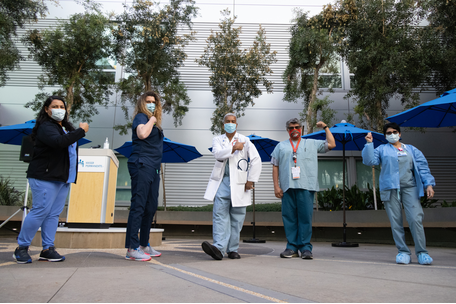
Kaiser Permanente study to assess COVID-19 antibodies in employees, physicians
A physician investigator in the Southern California Permanente Medical Group received a grant to study antibody responses to COVID-19 vaccination among health care workers. The study will also help learn more about the impact of booster vaccination and the rates of asymptomatic COVID-19 infection among the vaccinated.
Kaiser Permanente Southern California is inviting up to 2,000 of its employees and physicians to participate in a study that hopes to further establish the important role of vaccines in the COVID-19 pandemic.
When vaccine effectiveness is reported, the numbers generally refer to the percentage of people who remained free from illness and hospitalization. Mild or asymptomatic infections are much harder to detect, unless regular RNA testing for SARS-CoV-2 (the virus that causes COVID-19), is performed. While neutralizing antibody production was an important measure of success during vaccine development, there has been less focus on tests for the presence of antibodies in the blood (aka “serology”) as a potential metric for immunity.
“There’s a lot that is not yet known about how well commercial blood tests for SARS-CoV-2 serology reflect vaccination status and effective immunity,” said Darryl Palmer-Toy, MD, PhD, the physician director of the Regional Reference Core Laboratories. Effective immunity will be measured by neutralizing antibody assays and “breakthrough” infection rates. The latter is an outcome that most clinical trials to date have not studied.
With the voluntary participation of fully vaccinated employees and physicians, Dr. Palmer-Toy hopes to fill in these knowledge gaps with a new grant from the Garfield Memorial Fund and the Kaiser Permanente Community Health Research Fund.
The study is part of a larger project and includes 3 other Kaiser Permanente regions (Kaiser Permanente Colorado, Washington, and the Northwest).
Study participants will provide up to 3 blood samples. They will also provide weekly saliva samples, which should be convenient for those who work at medical facilities.
The study will focus on Kaiser Permanente Southern California health care workers due to their high vaccination rate. Participants will get to see the results of their serologic tests, which will be an incentive to join. “Many of them have reached out trying to obtain serologic testing to see whether their vaccine was effective, so we figured they would be interested in furthering this research,” said Dr. Palmer-Toy.
Dr. Palmer-Toy’s team will use these blood and saliva samples to answer several questions:
How well do the commercially available SARS-CoV-2 blood tests reflect vaccine-induced immunity?
We will use 4 different commercial tests in Kaiser Permanente labs across Southern California, Colorado, and Washington that look for anti-spike protein antibodies, which arise from vaccination or natural infection. These results we be comparted to measures of effective immunity. This study will provide more insight into the durability of effective immunity over time, the impact of booster vaccination, and whether these differ by vaccine vendor.
Does post-vaccination serology vary by prior infection?
The study will also test for anti-nucleocapsid protein antibodies, which strictly indicate past natural infection. This will help determine whether a history of COVID-19 infection influences the strength or duration of immunity provided by vaccines.
Does post-vaccination serology vary by demographics?
Serologic response to other vaccinations such as influenza vary by age and other factors, so this study will see if the same is true for COVID-19 vaccinations. The diversity of the KPSC employee and physician population provides the opportunity to assess whether serologic response varies by age, sex, ethnicity, and co-morbidities. “We thought this would be a good way to capture the breadth of our Southern California community,” said Dr. Palmer-Toy.
How can employees and physicians join the study?
Employees and physicians within Kaiser Permanente Southern California are invited to join the study to help us learn more about these important questions. To qualify, they must have had their final dose of the Pfizer or Moderna (2 doses) or Johnson & Johnson/Janssen (1 dose) vaccine in the past 6 to 9 months (January 15 to April 15) and not yet had a booster dose. Study participants can learn about their own antibody response to the COVID-19 vaccine. Interested staff and physicians can call 1-800-232-3619 or go to https://tinyurl.com/KPCOVIDserology for more details.





